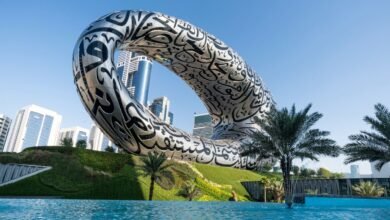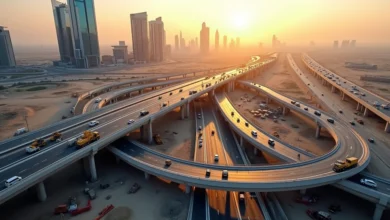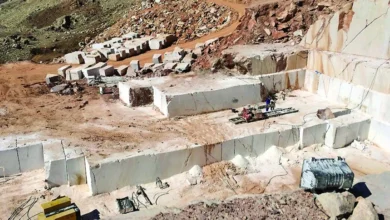
Pioneering Sustainability: DEWA’s Strategic Initiatives to Achieve Net-Zero by 2050
In an era where sustainability is not just a choice but a necessity, Dubai Electricity and Water Authority (DEWA) is taking significant strides toward achieving net-zero emissions by 2050. This ambitious goal underscores the critical role that energy sectors play in combating climate change and heralds a new chapter in DEWA’s commitment to sustainable and environmentally friendly practices. Through pioneering projects and groundbreaking initiatives, DEWA is not only enhancing its operational efficiency but also fostering a sustainable future for Dubai, aligning with the broader vision of the United Arab Emirates to lead a green revolution.
The journey toward this lofty aim involves a series of strategic measures, including the adoption of innovative technologies and the implementation of DEWA projects aimed at increasing the share of renewable and clean energy. This article will delve into the pioneering projects DEWA is undertaking to reach net-zero by 2050, such as DEWA solar initiatives, and explore the innovative initiatives that are setting new benchmarks in the energy sector. Furthermore, it will highlight how DEWA is supporting sustainable and green living in Dubai, providing a glimpse into the future outlook and DEWA’s continuous commitment to sustainability. Through a detailed exploration of these efforts, the article will showcase how DEWA is transforming Dubai into a model city for sustainable development in the 21st century.
Pioneering Projects for Net-Zero by 2050
The Mohammed bin Rashid Al Maktoum Solar Park
The Mohammed bin Rashid Al Maktoum Solar Park, a cornerstone of Dubai’s clean energy initiatives, stands as the largest single-site solar park in the world using the Independent Power Producer (IPP) model. By 2030, this park aims to boast a production capacity of 5,000 MW, with an investment of AED 50 billion. Once fully operational, it is projected to reduce over 6.5 million tons of carbon emissions annually, significantly contributing to the Dubai Clean Energy Strategy 2050 and the Dubai Net Zero Emissions Strategy 2050.
The Green Hydrogen Plant
Located within the expansive grounds of the Mohammed bin Rashid Al Maktoum Solar Park, the Green Hydrogen project represents a pioneering venture in the MENA region. This facility not only utilizes solar power to produce hydrogen but also sets the stage for future applications across various sectors including transportation and industry. The project produces approximately 400 kilograms of hydrogen daily, which is stored and potentially converted back to electrical energy, underscoring its role in Dubai’s strategy to achieve a carbon-neutral status by 2050.
Pumped-Storage Hydroelectric Power Plant in Hatta
The Hatta pumped-storage hydroelectric power plant, another innovative project under DEWA, is set to be the first of its kind in the Arabian Gulf region. With a capacity of 250 MW and an investment of approximately AED 1.42 billion, this facility will utilize water from the existing Hatta Dam to generate electricity during peak demand periods. This project not only supports the Dubai Clean Energy Strategy 2050 by providing renewable energy solutions but also aims to create significant job opportunities and enhance the region’s power stability.
Innovative Initiatives and Technological Advances
DEWA’s Focus on Renewable Energy Sources
Dubai Electricity and Water Authority (DEWA) is spearheading the adoption of renewable energy sources within the UAE. Central to this endeavor is the Mohammed bin Rashid Al Maktoum Solar Park, one of the world’s most extensive single-site solar parks, with an anticipated capacity of 5,000 megawatts (MW) by 2030. Alongside solar power, DEWA is exploring additional renewable sources, including wind and waste-to-energy, aiming to diversify its energy portfolio.
R&D and Innovation Centre Contributions
The R&D and Innovation Centre at DEWA plays a pivotal role in advancing renewable energy technologies. This facility is dedicated to research and development across various domains such as solar energy, energy storage, and smart grid technologies. It serves as a hub for innovation, driving improvements in the efficiency and reliability of renewable energy solutions.
Improvement in Photovoltaic Energy Efficiency
Significant strides have been made in enhancing the efficiency of photovoltaic (PV) energy systems, thanks to the efforts of DEWA’s R&D and Innovation Centre. Researchers are exploring new materials and technologies to boost solar panel performance. These innovations have led to an increase in solar panel efficiency from approximately 17% to over 20% in recent years, with ongoing research into bifacial solar panels that capture sunlight from both sides to further enhance energy generation.
Supporting Sustainable and Green Living in Dubai
Shams Dubai Initiative: Solar Energy in Buildings
The Shams Dubai Initiative, launched by DEWA, embodies the vision of HH Sheikh Mohammed bin Rashid Al Maktoum to transform Dubai into the smartest city globally. This initiative encourages the installation of photovoltaic (PV) panels on buildings, allowing owners to generate their electricity and connect to DEWA’s grid. The electricity produced is utilized onsite, with any surplus exported back to DEWA’s network. This endeavor not only promotes the use of clean and renewable energy but also supports the Dubai Clean Energy Strategy 2050, aiming for 75% energy from clean sources by 2050.
EV Green Charger Initiative: Promoting Electric Vehicles
- Launch and Expansion: Initiated to align with Dubai’s vision of becoming the smartest and happiest city, the EV Green Charger Initiative established the region’s first public charging infrastructure for electric vehicles. Starting with 100 charging stations in 2015, the network has expanded to over 380 stations, capable of serving more than 700 vehicles simultaneously.
- Sustainable Mobility: DEWA’s commitment to sustainable mobility solutions is evident in its exploration of innovative technologies to enhance the electric vehicle sector. This includes research into ultra-fast charging and mobile charging solutions.
- User Accessibility: The charging stations are accessible through DEWA’s website, smart app, and 14 other digital platforms. Customers can easily start and end their charging sessions using their mobile devices.
- Incentives for Adoption: To encourage the adoption of electric vehicles, DEWA provided free charging for all electric vehicle owners registered in the initiative until December 31st, 2021, for non-commercial users. This significantly contributed to the increase in electric vehicle usage in Dubai.
By fostering the use of solar energy in buildings and promoting electric vehicles, DEWA is making significant strides towards achieving a sustainable and green lifestyle in Dubai.
Future Outlook and Continuous Commitment
Expansion Plans for Clean Energy Production
Dubai Electricity and Water Authority (DEWA) is steadfast in its journey towards a sustainable future, with ambitious plans to increase its clean energy production capacity significantly. By the end of the first quarter of 2024, DEWA aims to add 233MW to its production, elevating its capacity to 2,860MW. The completion of the 6th phase of the Mohammed bin Rashid Al Maktoum Solar Park by the end of 2026 is expected to further boost the park’s capacity to 4,660MW. This expansion will enable the solar park to supply clean energy to approximately 1.4 million houses. By 2030, the initiative is projected to cut more than 6.5 million tonnes of carbon emissions annually, marking a significant step towards achieving net-zero by 2050.
Long-Term Vision for a Sustainable Net-Zero Carbon Future
DEWA’s commitment to a sustainable future is encapsulated in its long-term vision and strategic updates. Aligning with the UAE’s objectives and the declaration of 2023 as the ‘Year of Sustainability’, DEWA has refined its mission and vision to emphasize its dedication to achieving net-zero by 2050. This vision is supported by a comprehensive strategy that includes the cessation of new fossil fuel-based projects, the adoption of reverse osmosis technology for water desalination, and improving fuel consumption efficiency in production units to about 90%, one of the best levels globally. Furthermore, DEWA’s establishment of the Innovation Centre and the Research and Development (R&D) Centre at the Mohammed bin Rashid Al Maktoum Solar Park underscores its commitment to leveraging disruptive technologies for clean and efficient energy solutions. Through these strategic initiatives and the continuous expansion of its clean energy projects, DEWA is laying the groundwork for a sustainable net-zero carbon future, not only for Dubai but for the broader UAE.
As we have explored, Dubai Electricity and Water Authority (DEWA) is at the forefront of the global transition towards sustainable and renewable energy, with its comprehensive initiatives aimed at achieving net-zero emissions by 2050. From the expansive Mohammed bin Rashid Al Maktoum Solar Park, contributing substantially to the reduction of carbon emissions, to the pioneering Green Hydrogen and Hatta pumped-storage hydroelectric power plant projects, DEWA is setting a commendable example in the energy sector. These efforts are further bolstered by technological advances and the promotion of sustainable living practices among Dubai’s residents, solidifying the city’s position as a leader in renewable energy adoption and green living.
Looking ahead, DEWA’s unwavering commitment to its mission and its strategic expansion plans highlight a promising trajectory towards a sustainable, net-zero carbon future. This aligns seamlessly with the broader UAE’s vision for sustainability and sets a benchmark for energy sectors worldwide. The implications of these initiatives are profound, promising not only environmental benefits but also economic and social ones, by fostering innovation and creating job opportunities in the green economy. As Dubai continues to make strides in clean energy production and sustainable living, the ripple effects of its pioneering initiatives are bound to be felt well beyond its borders, encouraging further research, development, and adoption of renewable energy sources worldwide.







[…] Energy Strategy 2050 targeting 50% clean energy contribution […]
[…] Dubai Electricity and Water Authority‘s charging infrastructure has shown impressive expansion. The network now has more than 740 EV Green Charger points throughout the emirate. This network serves an electric vehicle community that grows faster each day and has reached 34,970 vehicles as of October 2024. […]
[…] Sustainability initiatives help regional brands stand out in all sectors. Companies with detailed sustainability strategies perform better than their competitors. Studies show that brands focused on sustainability drive more than 50% of organizational growth. Kering exemplifies this approach with clear sustainability targets. They plan to remove hazardous chemicals from production by 2025 and source all gold and diamonds from verified operations. […]